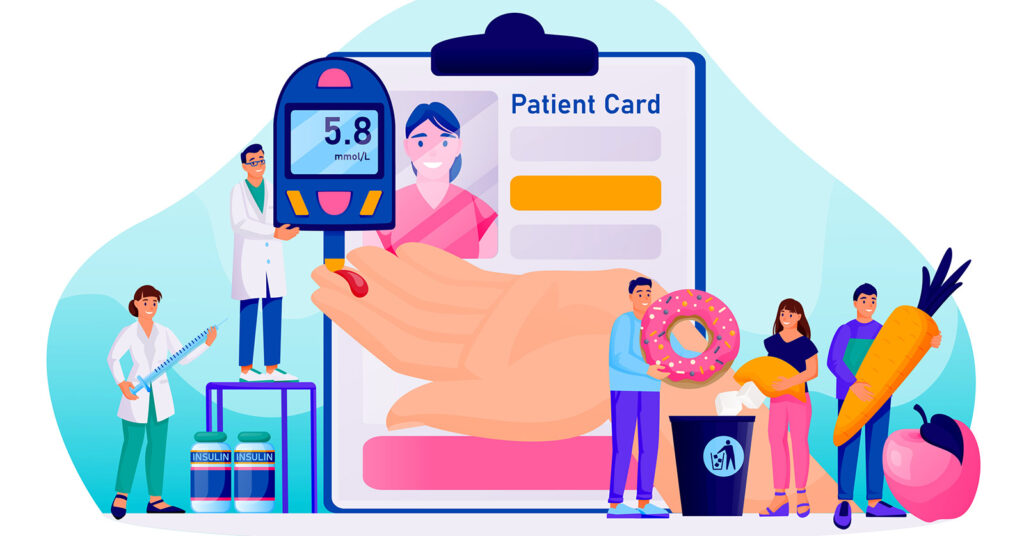
Diabetes is a disease that causes sugar to remain in the blood rather than entering the body’s cells to be used for energy. Over time, high blood sugar can damage many of the body’s systems, leading to kidney disease, eye problems, nerve or vessel damage, problems with teeth or skin, foot pain, or other chronic health conditions.
What’s more, diabetes medications are costly. If you have diabetes you may be taking several oral medications in addition to insulin injections to control your blood sugar. Yet with weight loss and other lifestyle changes, many people can effectively manage their disease with fewer medications.
More than 122 million Americans are living with diabetes or prediabetes, a condition marked by rising blood sugar levels that, if untreated, can lead to full-blown diabetes. (Note: this post is about type 2 diabetes in adults. Read about other types by typing “diabetes” in the search window above.)
CHECK WITH YOUR DOCTOR
If you’ve been diagnosed with type 2 diabetes, your doctor will likely recommend certain medications, such as insulin, and may also advise you to make certain lifestyle changes that will stabilize your blood sugar levels.
Your doctor may tell you that you’re prediabetic, meaning your blood sugar is higher than normal but not high enough to be considered diabetes. More than 88 million adults in America have prediabetes, and a large proportion are unaware of it.
The good news is that, with proper management, prediabetes can be reversed. But even if your condition has advanced to full-blown diabetes, there is much you can do to alleviate many of the symptoms and keep your blood sugar under control.
THE ROAD TO A HEALTHIER LIFESTYLE
Your doctor can help you develop a diabetes management plan that will address diet, exercise, medications and, in some cases, regular testing to ensure your blood sugar levels remain stable. A nutritionist or dietician can help you refine your plan, helping you establish good health habits that will support healthy management of your diabetes or prediabetes. Recommendations may include:
Track Your Carbs
Carbohydrates, such as bread, white flour and rice, and refined sugar, can derail your diabetes management plan—and play havoc with your blood sugar levels. The carbs found in fruits, vegetables and whole grains, however, not only provide important nutrients but also help stabilize your blood sugar levels.
Control Your Portions
Pay attention to portion size. Too little food in proportion to your diabetes medications may cause your blood sugar levels to dip, while a large, starchy meal may cause a spike.
Avoid Sugar-sweetened Beverages
Sodas, sports drinks, even bottled iced tea can contain large amounts of refined sugar, which can cause a rapid rise in blood sugar levels. Artificial sweeteners found in diet sodas don’t impact your blood sugar levels, but they can be high in sodium. Drink plain water to stay hydrated or try flavored waters and seltzers as a substitute.
Exercise Regularly
Your muscles use glucose for energy, and regular exercise helps your body use insulin more efficiently. Aim for about 30 minutes of moderate aerobic activity at least three or four times per week.
WARNING SIGNS
Always be aware of the warning signs of a drop in your blood sugar levels. If you start feeling shaky, weak, tired, hungry, lightheaded, irritable, anxious or confused, it might mean your blood sugar levels are too low. Carry a snack with you to offset the effect and see your doctor if the condition persists.
See immediate medical care if you have diabetes and develop any of the following signs or symptoms:
- deep, rapid breathing
- nausea or vomiting
- stomach pain
- flushed complexion
- confusion
- fruity smelling breath
WORK CITED
“Diabetes Basics.” Centers for Disease Control and Prevention. Accessed Oct. 3, 2020. https://www.cdc.gov/diabetes/basics/index.html
“Diabetes management: How lifestyle, daily routine affect blood sugar.” Mayo Clinic, June 6, 2020. https://www.mayoclinic.org/diseases-conditions/diabetes/in-depth/diabetes-management/art-20047963
“Diabetes Care.” Baylor College of Medicine. Accessed Oct. 7, 2020. https://www.bcm.edu/healthcare/specialties/endocrinology/diabetes-care Watson, Stephanie.
“Everything You Need to Know About Diabetes.” Healthline Media.Last update: Feb. 26, 2020. https://www.healthline.com/health/diabetes





